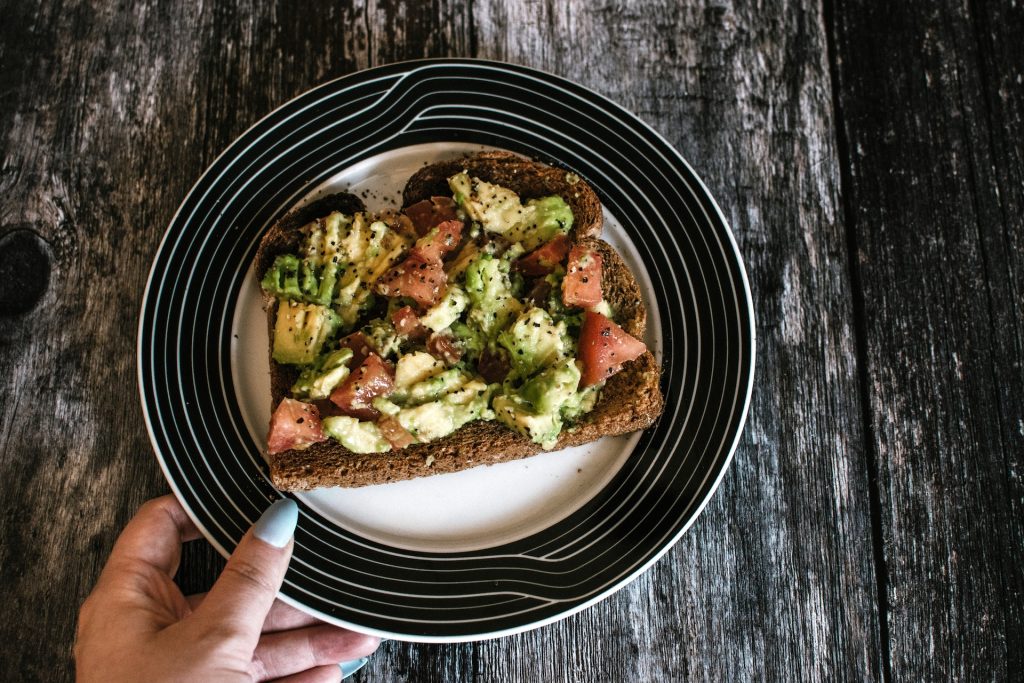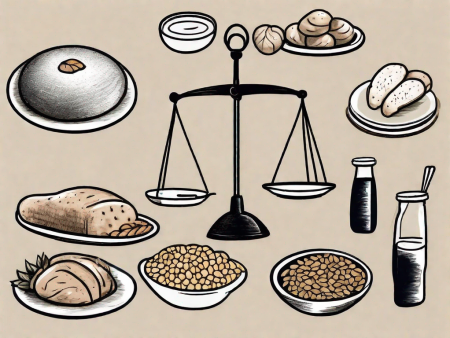Discover the surprising benefits of adopting a gluten-free diet for managing various skin conditions.
Uncovering the Benefits of a Gluten-Free Diet for Skin Conditions
Are you tired of dealing with pesky skin conditions that just won’t go away? Well, have you ever considered going gluten-free? That’s right – removing gluten from your diet might actually be the secret to healthy, glowing skin. In this article, we’ll dive into the fascinating world of gluten and its effects on the body, explore the connection between gluten and skin conditions, and uncover the science behind why a gluten-free diet can be a game-changer for your skin health. So, grab a gluten-free snack and let’s get started!
Understanding Gluten and Its Effects on the Body
Before we can talk about how gluten affects your skin, let’s first understand what gluten actually is. Gluten is a protein found in wheat, barley, and rye. It gives dough its elasticity and helps it rise. Sounds harmless, right? Wrong! For some people, gluten can wreak havoc on their bodies, leading to a variety of health issues.
Gluten, that sneaky little protein, has a way of sticking around in your gut like a clingy ex who just won’t leave you alone. It’s like the frenemy you never wanted. This sticky protein can trigger an immune response in certain individuals, leading to inflammation and damage to the intestines. And guess what? That inflammation can show up on your skin too! But don’t worry, we’ll get to that in a bit.

What is Gluten?
Now that we’ve established gluten as the clingy ex of proteins, let’s dive a little deeper into its composition. Gluten is actually made up of two proteins: gliadin and glutenin. These proteins are responsible for the stretchy, elastic texture that gluten gives to dough. When combined with water, gliadin and glutenin form a sticky network that traps air bubbles, allowing bread to rise and giving it that fluffy texture we all love.
However, for some unlucky individuals, this seemingly harmless protein can trigger a cascade of health issues. Those with gluten sensitivity or celiac disease have immune systems that mistake gluten for a dangerous invader. When gluten enters their bodies, it’s like a bomb going off. The immune system goes into panic mode, mistakenly attacking the gluten and the lining of the small intestine.
How Gluten Affects the Body
So, what happens when the immune system goes haywire in response to gluten? Well, it’s not pretty. The inflammation caused by the immune system’s attack can wreak havoc on the body, leading to a range of symptoms. Digestive issues, such as bloating, diarrhea, and abdominal pain, are common. Fatigue and brain fog can also plague those with gluten sensitivity or celiac disease.
But wait, there’s more! Skin problems are also on the menu when it comes to the effects of gluten on the body. The inflammation triggered by gluten can manifest as various skin conditions, including dermatitis herpetiformis, a blistering and itchy rash. This rash is often found on the elbows, knees, buttocks, and scalp, and can be a telltale sign of gluten sensitivity or celiac disease.
It’s important to note that not everyone who experiences skin problems has a gluten-related issue. However, if you’ve been struggling with persistent skin issues that don’t seem to respond to conventional treatments, it might be worth exploring the possibility of gluten sensitivity or celiac disease.
So, if your skin has been acting up and you suspect gluten might be the culprit, it might be time to kiss gluten goodbye. By eliminating gluten from your diet, you may be able to alleviate not only your skin problems but also a range of other symptoms that have been plaguing you. It’s always best to consult with a healthcare professional before making any major dietary changes, but it’s worth considering if gluten could be the root cause of your health woes.
The Connection Between Gluten and Skin Conditions
Now that we’ve got a handle on what gluten is and how it affects the body, let’s dig into the juicy stuff. So, how exactly does gluten cause skin conditions? Well, it turns out that gluten can be a nemesis for your skin, causing a whole host of problems. Let’s explore a few of them:
Gluten and Dermatitis Herpetiformis
Dermatitis Herpetiformis, or DH for short, is the gluten-sensitive person’s worst nightmare. This itchy, blistering skin rash is like having a one-way ticket to Scratchville. It’s not for the faint of heart. The connection between gluten and DH is so strong that it’s often considered a skin manifestation of celiac disease. So, if you’ve been dealing with relentless itching and weird skin bumps, gluten might just be the culprit.
But what exactly is happening in the body when gluten triggers DH? Well, it all starts with an immune system response. In individuals with celiac disease or gluten sensitivity, consuming gluten causes the immune system to go haywire. Instead of attacking harmful invaders, the immune system mistakenly attacks the body’s own tissues, including the skin. This immune response leads to the formation of the characteristic itchy, blistering rash seen in DH.
Interestingly, DH is not limited to the areas of the body that come into direct contact with gluten. It can appear on various parts of the body, including the elbows, knees, buttocks, and scalp. The severity of the rash can also vary from person to person, with some experiencing mild discomfort and others enduring intense itching and pain.
Gluten and Psoriasis
Psoriasis is like the red-headed stepchild of skin conditions – it just won’t leave you alone. It’s characterized by thick, red, scaly patches that can drive even the most patient person crazy. And here’s the kicker: studies have shown a possible link between gluten and psoriasis flare-ups. So, if you’re tired of feeling like a human lizard, a gluten-free diet might be worth a shot.
Psoriasis is a chronic autoimmune disease that affects the skin, causing an accelerated growth of skin cells. In individuals with psoriasis, the immune system mistakenly triggers inflammation, leading to the rapid turnover of skin cells. This results in the formation of the characteristic plaques seen in psoriasis.
While the exact relationship between gluten and psoriasis is still being studied, some researchers believe that gluten may contribute to the inflammation seen in psoriasis. It is thought that gluten may trigger an immune response in susceptible individuals, leading to the worsening of psoriasis symptoms. However, more research is needed to fully understand this connection.
Gluten and Eczema
Oh, eczema – the ultimate attention-seeking skin condition. Itchy, dry, and oh-so-obnoxious, eczema is a constant reminder that our bodies are complex little beasts. While gluten isn’t a direct cause of eczema, some people with gluten sensitivity have reported improvements in their symptoms after going gluten-free. So, if your eczema is driving you up the wall, it might be time to investigate the gluten connection.
Eczema, also known as atopic dermatitis, is a chronic inflammatory skin condition characterized by dry, itchy, and inflamed skin. It is commonly associated with allergies and immune system dysfunction. While the exact cause of eczema is still unknown, it is believed to involve a combination of genetic and environmental factors.
Some individuals with eczema may also have gluten sensitivity or celiac disease. Although gluten is not considered a direct cause of eczema, it is believed that gluten consumption may exacerbate inflammation in susceptible individuals, leading to worsened eczema symptoms. By eliminating gluten from their diet, some people with eczema have reported a reduction in itchiness and flare-ups.
It’s important to note that not everyone with skin conditions will experience improvements by going gluten-free. Each person’s body is unique, and what works for one individual may not work for another. If you suspect that gluten may be contributing to your skin condition, it is always best to consult with a healthcare professional for proper diagnosis and guidance.
The Science Behind Gluten-Free Diets and Skin Health
Now that we’ve explored how gluten can wreak havoc on your skin, let’s take a deep dive into the science behind why a gluten-free diet can be a game-changer for your skin health.

The Role of Inflammation
Inflammation – the sworn enemy of clear, radiant skin. When gluten triggers an immune response, it sets off a cascade of inflammation throughout the body. This inflammation can manifest on the skin as redness, swelling, and even acne. By eliminating gluten from your diet, you can help calm the inflammatory response and give your skin a fighting chance at looking its best.
Nutrient Absorption and Skin Health
Remember how we mentioned that gluten can damage the lining of the small intestine? Well, here’s why that matters – your gut is responsible for absorbing essential nutrients, like vitamins and minerals. When the gut is compromised, nutrient absorption takes a hit, and your skin can suffer the consequences. A gluten-free diet can help heal the gut and improve nutrient absorption, giving your skin the nourishment it needs to shine.
Transitioning to a Gluten-Free Diet
So, you’re ready to ditch the gluten and embrace a life of clear, glowing skin? Fantastic! But before you jump headfirst into the gluten-free abyss, let’s talk about some practical tips for transitioning to a gluten-free diet.
Identifying Gluten in Your Diet
Gluten likes to hide in unexpected places, like that hide and seek champion you could never find. It lurks in products like bread, pasta, beer, and even soy sauce. To successfully go gluten-free, you’ll need to become a master detective at reading food labels. Look for buzzwords like wheat, barley, and rye – these are your gluten archenemies.
Gluten-Free Alternatives
Just because you’re going gluten-free doesn’t mean you have to give up all your favorite foods. Thankfully, there are a plethora of gluten-free alternatives available. From fluffy gluten-free bread to crispy pizzas and chewy cookies, the gluten-free world is your oyster. So, fear not – you won’t be missing out on deliciousness on your gluten-free journey.
Maintaining a Balanced Gluten-Free Diet
Hooray! You’ve successfully transitioned to a gluten-free diet. But wait… how do you make sure you’re still getting all the essential nutrients your body needs? We’ve got you covered!
Essential Nutrients and Gluten-Free Diets
A gluten-free diet doesn’t have to mean a nutrient-deficient diet. It’s all about balance, baby! To ensure you’re getting all the vitamins, minerals, and fiber your body craves, load up on whole, naturally gluten-free foods like fruits, vegetables, lean proteins, and gluten-free grains like quinoa and brown rice. Your body and your skin will thank you.
Potential Challenges and Solutions
Transitioning to a gluten-free diet can have its fair share of challenges. From dining out to dealing with well-meaning friends who just don’t understand, it can feel like an uphill battle at times. But fear not, intrepid gluten-free warrior! We’ve got a few tricks up our sleeve to help you navigate these challenges like a pro.
So, there you have it – the not-so-secret secret to healthier, happier skin: a gluten-free diet. From reducing inflammation to improving nutrient absorption, going gluten-free is like pressing the reset button on your skin health. So, if you’re tired of dealing with those stubborn skin conditions, why not give it a shot? Your skin will thank you, and who knows, you might just uncover a whole new world of delicious gluten-free treats along the way. Happy gluten-free adventures!







